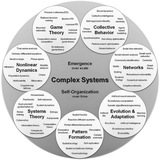⚡️ Modern physics provides a precise language to capture the way things #scale: the so-called #renormalization_group. This mathematical formalism allows us to go systematically from the small to the large. The essential step is taking averages. For example, instead of looking at the behavior of individual atoms that make up matter, we can take little cubes, say 10 atoms wide on each side, and take these cubes as our new building blocks. One can then repeat this averaging procedure.
#Renormalization theory describes in detail how the properties of a physical system change if one increases the length scale on which the observations are made. A famous example is the electric charge of particles that can increase or decrease depending on quantum interactions. A sociological example is understanding the behavior of groups of various sizes starting from individual behavior. Is there wisdom in crowds, or do the masses behave less responsibly?
Most interesting are the two endpoints of the renormalization process: the infinite large and infinite small. Here things will typically simplify because either all details are washed away, or the environment disappears. Both the largest and the smallest structures of the universe are astonishingly #simple. It is here that we find the two “standard models,” of #particle_physics and #cosmology.
🔗 https://www.quantamagazine.org/to-solve-the-biggest-mystery-in-physics-join-two-kinds-of-law-20170907/
#Renormalization theory describes in detail how the properties of a physical system change if one increases the length scale on which the observations are made. A famous example is the electric charge of particles that can increase or decrease depending on quantum interactions. A sociological example is understanding the behavior of groups of various sizes starting from individual behavior. Is there wisdom in crowds, or do the masses behave less responsibly?
Most interesting are the two endpoints of the renormalization process: the infinite large and infinite small. Here things will typically simplify because either all details are washed away, or the environment disappears. Both the largest and the smallest structures of the universe are astonishingly #simple. It is here that we find the two “standard models,” of #particle_physics and #cosmology.
🔗 https://www.quantamagazine.org/to-solve-the-biggest-mystery-in-physics-join-two-kinds-of-law-20170907/
Quanta Magazine
To Solve the Biggest Mystery in Physics, Join Two Kinds of Law
Reductionism breaks the world into elementary building blocks. Emergence finds the simple laws that arise out of complexity. These two complementary ways of
💰 The relevance of thermodynamics to economics
https://en.wikipedia.org/wiki/Nicholas_Georgescu-Roegen#The_relevance_of_thermodynamics_to_economics
The physical theory of #thermodynamics is based on two laws: The first law states that energy is neither created nor destroyed in any isolated system (a conservation principle). The second law of thermodynamics — also known as the #entropy law — states that energy tends to be degraded to ever poorer qualities (a degradation principle).
Georgescu argues that the relevance of thermodynamics to #economics stems from the physical fact that man can neither create nor destroy matter or energy, only transform it. The usual economic terms of "#production" and "#consumption" are mere verbal conventions that tend to obscure that nothing is created and nothing is destroyed in the economic process — everything is being transformed.
The science of thermodynamics features a #cosmology of its own predicting the #heat_death_of_the_universe: Any transformation of energy — whether in nature or in human society — is moving the universe closer towards a final state of inert physical uniformity and #maximum_entropy. According to this cosmological perspective, all of man's economic activities are only speeding up the general march against a future planetary heat death locally on earth, Georgescu submits. This view on the economy was later termed '#entropy_pessimism'. Some of Georgescu's followers and interpreters have elaborated on this view.
https://en.wikipedia.org/wiki/Nicholas_Georgescu-Roegen#The_relevance_of_thermodynamics_to_economics
The physical theory of #thermodynamics is based on two laws: The first law states that energy is neither created nor destroyed in any isolated system (a conservation principle). The second law of thermodynamics — also known as the #entropy law — states that energy tends to be degraded to ever poorer qualities (a degradation principle).
Georgescu argues that the relevance of thermodynamics to #economics stems from the physical fact that man can neither create nor destroy matter or energy, only transform it. The usual economic terms of "#production" and "#consumption" are mere verbal conventions that tend to obscure that nothing is created and nothing is destroyed in the economic process — everything is being transformed.
The science of thermodynamics features a #cosmology of its own predicting the #heat_death_of_the_universe: Any transformation of energy — whether in nature or in human society — is moving the universe closer towards a final state of inert physical uniformity and #maximum_entropy. According to this cosmological perspective, all of man's economic activities are only speeding up the general march against a future planetary heat death locally on earth, Georgescu submits. This view on the economy was later termed '#entropy_pessimism'. Some of Georgescu's followers and interpreters have elaborated on this view.
Wikipedia
Nicholas Georgescu-Roegen
Mathematician, Statistician and Economist (1906-1994)
